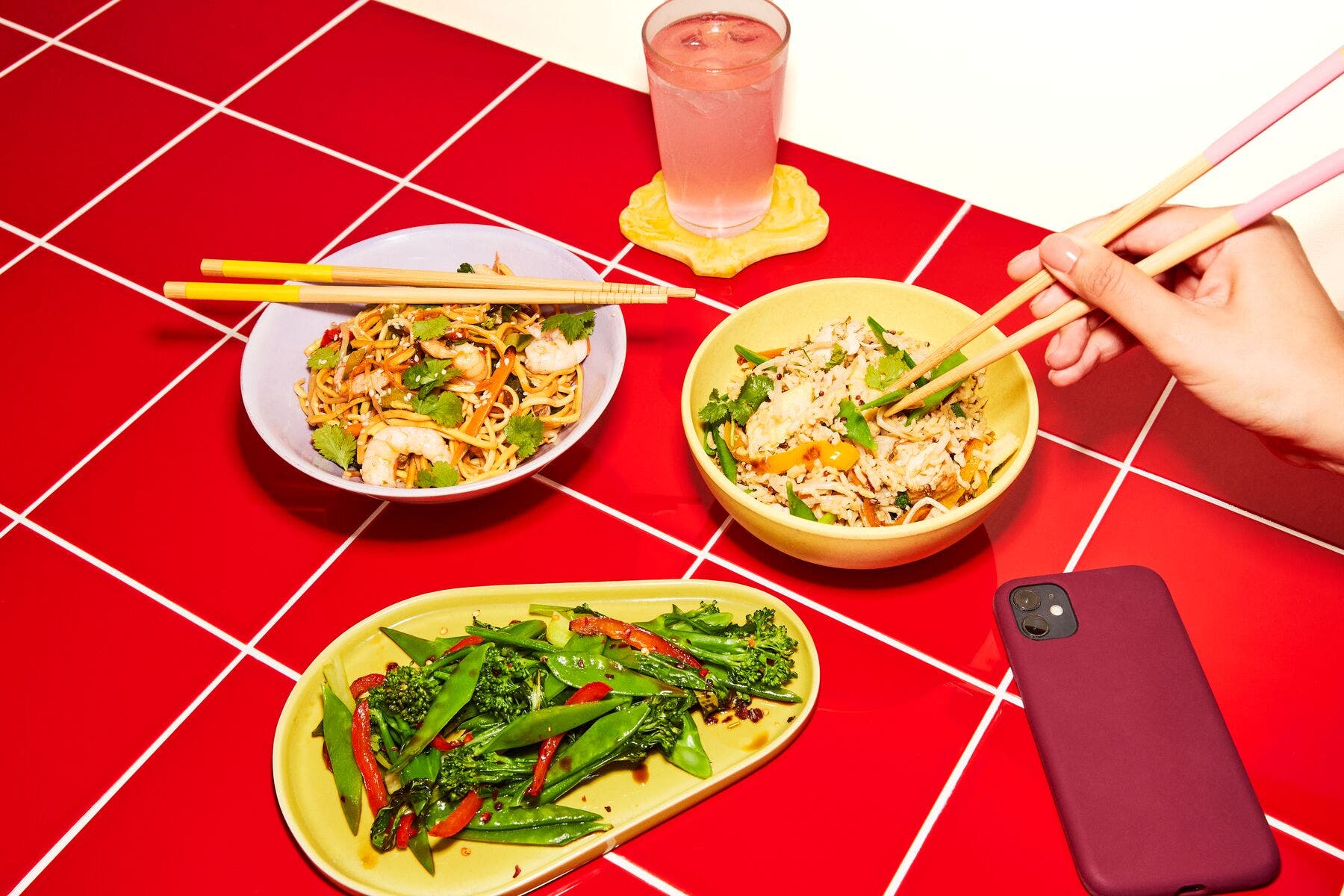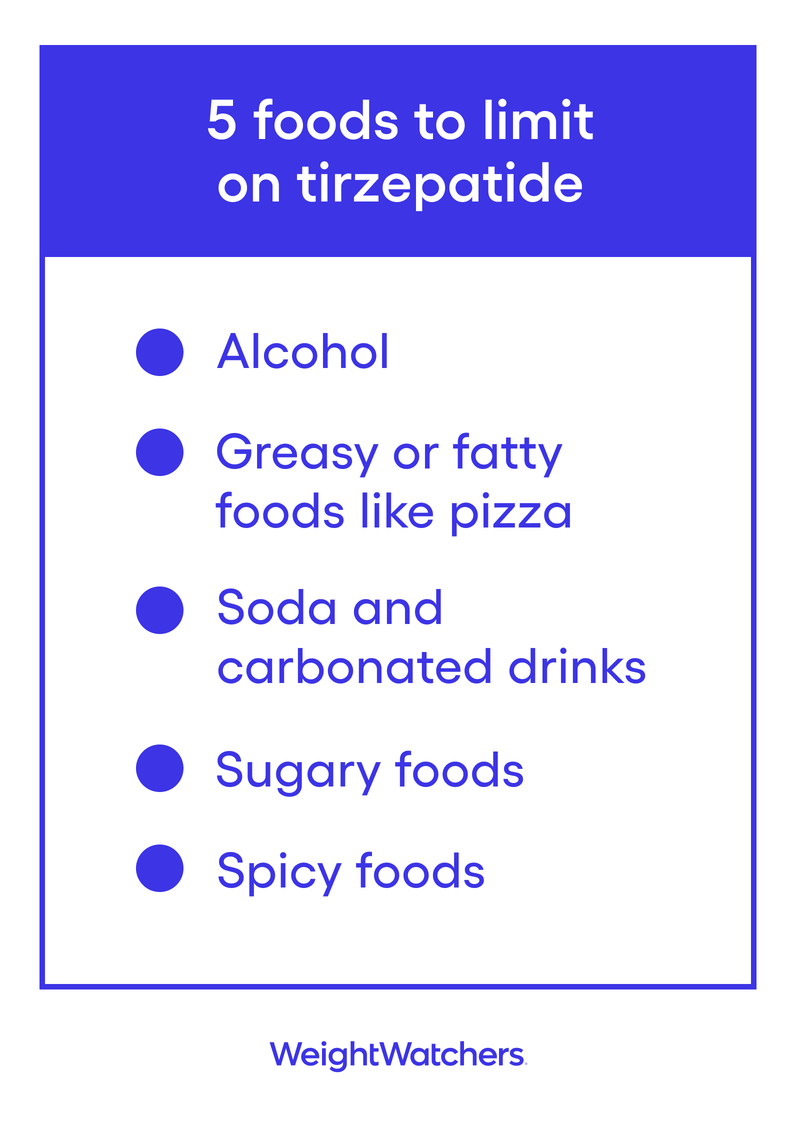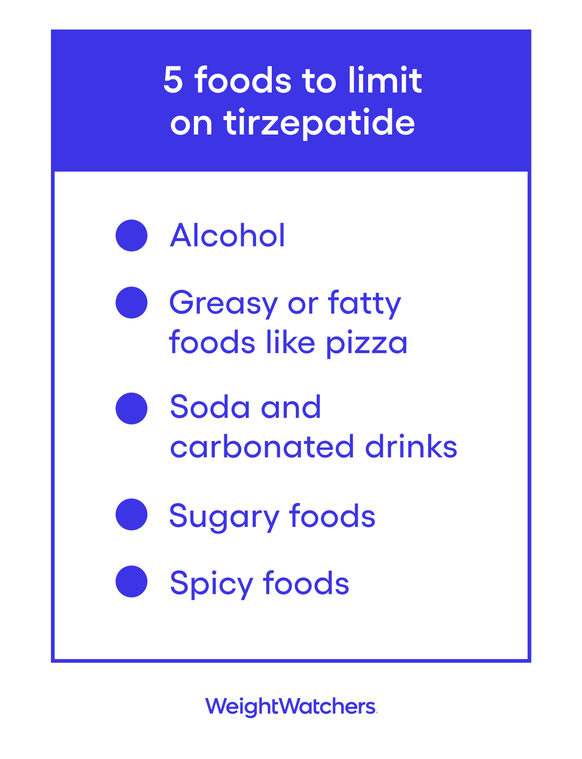What foods should you avoid while on Zepbound?


Instagram vs. reality can be pretty far apart for most things. See: spotless entryways, 18-step morning routines, vacations with kids, and — if we’re really honest — losing weight on a medication like tirzepatide. Social media is packed with misinformation about taking weight-loss medications, including that your food choices don’t matter because you’ll lose weight no matter what.
Zepbound, which has the active ingredient tirzepatide and is FDA-approved for weight loss, dials down how hungry you feel and can lead you to eat less. But, like other GLP-1 medications, you still need to pay close attention to what’s on your plate — to mitigate side effects, support your weight loss, and boost your overall well-being. Here’s how.
What is Zepbound — and how does it work?
Zepbound is similar to other GLP-1 weight-loss medications like semaglutide (Wegovy) and liraglutide (Saxenda). These medications work by mimicking a gut hormone called GLP-1 (short for glucagon-like peptide-1). GLP-1 helps control your blood sugar, curb appetite, and slow stomach emptying when you eat — effects that are extended for hours when you take a GLP-1 agonist. Unlike semaglutide, Zepbound also targets glucose-dependent insulinotropic polypeptide (GIP) receptors in the stomach and brain.
When combined, GLP-1 and GIP can boost one another’s effects, working together to suppress your appetite and reduce cravings better than each alone. “Unlike GLP-1, GIP also reduces acid production in the stomach, which slows down the digestion of food, and restores the body’s sensitivity to insulin,” says Dr. Caroline Messer, M.D., a professor of medicine, endocrinology, diabetes, and bone disease at Icahn School of Medicine at Mount Sinai in New York City. GIP may also have a direct effect on increasing the amount of fat burned, she says. Research has found that people on the highest dose of tirzepatide (15mg) can lose an average of 21% of their weight after around a year and a half.
The most common Zepbound side effects
GLP-1 agonists like Zepbound partly work in the gut, which is why many of their potential side effects are gastrointestinal in nature. Possible side effects include:
- Abdominal pain
- Constipation
- Diarrhea
- Nausea
- Upset stomach
- Vomiting
For a complete list of side effects, please visit the Zepbound website here.
5 types of food to avoid with Zepbound
Because side effects are mostly gastrointestinal, it makes sense that certain foods can make them worse. Generally speaking, “foods that slow gastric emptying, like tirzepatide, can increase side effects,” says Dr. Holly Lofton, M.D., professor of medicine and surgery at NYU Grossman School of Medicine and the director of the Medical Weight Management Program at NYU Langone Health in New York City. If a medication keeps food in your stomach for longer, eating foods that also prolong that process can intensify stomach issues.
These are some of the types of foods to watch out for.
- Alcohol has calories but doesn’t provide any nutrients and drinks with a high alcohol content (such as those above 15%) can slow gastric emptying.
- Greasy or fatty foods, such as pizza and French fries, can make you feel overly full and are digested slowly, increasing the risk of nausea, vomiting, and heartburn.
- Soda and other carbonated drinks can increase the risk of nausea and acid reflux.
- Sugary and highly processed foods may not make side effects worse, but they can fill you up without supplying you with the nutrients you need — like fiber, vitamins, and protein.
- Spicy foods can exacerbate acid reflux, especially if you already had acid reflux before getting on the medications.
As always, please consult your healthcare provider before making dietary changes. And not everyone will react the same to all foods, so it’s worthwhile to notice which of the above makes you feel worse. Then, be more mindful about when you eat those foods.


What to eat while taking Zepbound
While there’s no single “Zepbound diet” to follow, eating strategically can help you feel more comfortable. For instance, staying hydrated and eating plenty of fiber are both shown to help reduce the risk of constipation, according to Messer. At the same time, protein can help you hold on to your muscle while losing weight. That means you should reach for foods like vegetables and fruits (which are full of nutrients and fiber) plus whole grains, lean meats, seafood, eggs, tofu, and beans (which are rich in fiber and protein).
How do I maximize my weight loss on Zepbound?
It’s important to pair tirzepatide medications like Zepbound with healthy lifestyle changes, especially strength training. “As patients lose weight, they inevitably lose muscle,” says Messer. “For this reason, I recommend both aerobic and resistance exercises to increase muscle tone.”
These habits can benefit both weight loss and your overall health. (Remember: The goal is better weight health, which is when you feel your best and improve your quality of life.) Plus, healthy habits can also be helpful if you ever decide to stop taking Zepbound. The latest research has found that stopping tirzepatide can cause people to regain two-thirds of the weight they lost within a year. This is a big reason why these medications are designed for long-term use.
You don’t need to try to make these new lifestyle changes alone. The WeightWatchers GLP-1 Program is designed to help you prioritize these healthy habits — eating more protein and fiber, staying hydrated, and exercising regularly — while WeightWatchers Clinic can help if you need more one-on-one help with board-certified doctors, registered dietitians, and fitness coaches.
The bottom line
Like all GLP-1s, Zepbound comes with the potential for side effects such as constipation and nausea (for a complete list of side effects, please visit the Zepbound website here). But paying attention to your diet, like by limiting high-fat meals and prioritizing nutrient-dense foods high in protein and fiber, can possibly help reduce those side effects. Those smarter food choices, along with other lifestyle changes like increasing your exercise, will help you gain health and feel great while losing weight on a weight-loss program.
This content is for informational purposes only and does not constitute medical advice, diagnosis or treatment. It should not be regarded as a substitute for guidance from your healthcare provider.
FAQ
Yes, you can eat pizza — and anything else — on Zepbound. But most pizza is high in fat from the cheese, which can make side effects worse. It’s worth paying attention to how you feel when you eat pizza and, if it doesn’t sit well with you, choosing to eat it less often may be helpful on your weight-loss journey.
Some people just don’t respond to medication, including GLP-1s. “There’s a certain percentage of people who take tirzepatide and will be non-responders, which is defined as losing less than 5% of one’s weight,” says Lofton. If that’s the case, talk to your doctor about trying a different medication and seeing if it’s more effective.
WeightWatchers does not directly sell any medication. That said, WeightWatchers Clinic can connect you to certified clinicians who can evaluate your health and, if appropriate, prescribe GLP-1 agonists like Zepbound.
WeightWatchers relies on only the most trustworthy sources, including highly credentialed experts, government and academic institutions, peer-reviewed studies, and respected medical associations. We focus on primary sources and research that is recent, relevant, and high-quality. For more about how we report, write, and fact check our stories, please see our editorial policy.
Zepbound approval: U.S. Food & Drug Administration. (2023) "FDA Approves New Medication for Chronic Weight Management." https://www.fda.gov/news-events/press-announcements/fda-approves-new-medication-chronic-weight-management
Tirzepatide results: The New England Journal of Medicine. (2022) "Tirzepatide Once Weekly for the Treatment of Obesity." https://www.nejm.org/doi/full/10.1056/NEJMoa2206038
Average Weight Loss with Wegovy: Nature Medicine. (2022) "Two-year effects of semaglutide in adults with overweight or obesity: the STEP 5 trial." https://www.nature.com/articles/s41591-022-02026-4
Tirzepatide side effects: Journal of the Endocrine Society. (2023) "Adverse Events Related to Tirzepatide." https://www.ncbi.nlm.nih.gov/pmc/articles/PMC9915969/
Tirzepatide versus semaglutide: The New England Journal of Medicine. (2021) "Tirzepatide versus Semaglutide Once Weekly in Patients with Type 2 Diabetes." https://www.nejm.org/doi/full/10.1056/nejmoa2107519
Protein sources: MedlinePlus. (2023) "Protein in diet." https://medlineplus.gov/ency/article/002467.htm
Healthy fat sources: Nutrition Journal. (2017) "A healthy approach to dietary fats: understanding the science and taking action to reduce consumer confusion." https://www.ncbi.nlm.nih.gov/pmc/articles/PMC5577766/
Regaining weight: JAMA. (2023) "Continued Treatment With Tirzepatide for Maintenance of Weight Reduction in Adults With Obesity." https://jamanetwork.com/journals/jama/fullarticle/2812936
Alcohol and gastric emptying: Rev Recent Clin Trials. (2016) “The Effect of Alcohol on Gastrointestinal Motility.” https://pubmed.ncbi.nlm.nih.gov/27527893/
